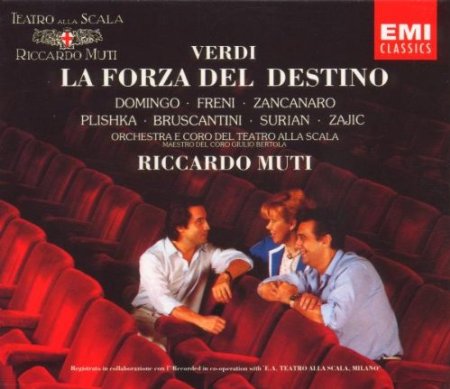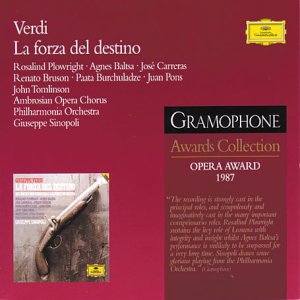Verdi La forza del destino
View record and artist detailsRecord and Artist Details
Composer or Director: Giuseppe Verdi
Genre:
Opera
Label: EMI
Magazine Review Date: 2/1987
Media Format: CD or Download
Media Runtime: 164
Mastering:
DDD
Catalogue Number: 747485-8

Tracks:
| Composition | Artist Credit |
|---|---|
| (La) forza del destino, '(The) force of destiny' |
Giuseppe Verdi, Composer
Dolora Zajick, Preziosilla, Mezzo soprano Ernesto Gavazzi, Trabuco, Tenor Francesca Garbi, Curra, Mezzo soprano Giorgio Surian, Marquis of Calatrava, Bass Giorgio Zancanaro, Don Carlo, Baritone Giuseppe Verdi, Composer Milan La Scala Chorus Milan La Scala Orchestra Mirella Freni, Leonora, Soprano Paul Plishka, Padre Guardiano, Bass Plácido Domingo, Don Alvaro, Tenor Riccardo Muti, Conductor, Bass Sesto Bruscantini, Fra Melitone, Baritone Silvestro Sammaritano, Mayor, Bass |
Composer or Director: Giuseppe Verdi
Genre:
Opera
Label: Gramophone Awards Collection
Magazine Review Date: 5/1987
Media Format: CD or Download
Media Runtime: 178
Mastering:
Stereo
DDD
Catalogue Number: 419 203-2GH3

Tracks:
| Composition | Artist Credit |
|---|---|
| (La) forza del destino, '(The) force of destiny' |
Giuseppe Verdi, Composer
Agnes Baltsa, Preziosilla, Mezzo soprano Ambrosian Opera Chorus Giuseppe Sinopoli, Conductor Giuseppe Verdi, Composer Jean Rigby, Curra, Mezzo soprano John Tomlinson, Marquis of Calatrava, Bass José Carreras, Don Alvaro, Tenor Juan Pons, Fra Melitone, Baritone Mark Curtis, Trabuco, Tenor Paata Burchuladze, Padre Guardiano, Bass Petteri Salomaa, Surgeon, Bass Philharmonia Orchestra Renato Bruson, Don Carlo, Baritone Richard Van Allan, Mayor, Bass Rosalind Plowright, Leonora, Soprano |
Author: Richard Osborne
The glorious centrepiece of EMI's La Scala, Milan recording which I reviewed in these columns in February, is Domingo's Don Alvaro, powerfully complemented by Zancanaro's Don Carlo. If DG's new set has a major weakness it is in the great central movement of Act 3 (''Solenne in quest'ora'', ''Urna fatale'', and so on) where Carreras sings with ardour but suddenly diminished control and where Bruson rather sadly begins to show his years. That said, their great Act 4 confrontation goes rather well, despite the usual impossibly gabbled end, and I would have few quarrels with Carreras's singing earlier in the opera. As a performance it lacks the penetrating interpretative distinction of Domingo's on EMI. Domingo's Don Alvaro is an aristocratic warrior capable of high passion and chilling irony; Carreras's Don Alvaro is a personable hot-head. Sounding remarkably like Giuseppe di Stefano in his prime, Carreras's singing stimulates, in this listener at least, a physical sensation not dissimilar to a warming double brandy tossed gratefully back with promise of more to come.
But La forza del destino is more, far more, than a single big duet; elsewhere DG's set nudges, elbows, and occasionally knocks the EMI set into second place. For one thing, there are no weaknesses in DG's casting of the mass of tiny but dramatically crucial comprimario roles, from perfectly shaped vignettes (Mark Curtis's Trabuco, Jean Rigby's Curra, John Tomlinson's Marchese, and the Mayor of Richard Van Allan, no less) to full-drawn small portraits: a glorious Melitone from Juan Pons (outpointing EMI's veteran Sesto Bruscantini at every juncture) and quite the best Preziosilla we have yet had on record, from Agnes Baltsa. The freedom and verve of Baltsa's singing in the Act 1 Inn scene and the brilliance of Verdi's orchestral commentary as revealed to us by Sinopoli and the Philharmonia Orchestra (who play supremely well throughout the set) are a joy from start to finish. Add Burchuladze's immensely imposing portrayal of Il Padre Guardiano (richer voiced than Plishka and occasionally nimbler, too) and the stage is well set for the opera in general and Leonora in particular to make their mark.
Which is precisely what Rosalind Plowright proceeds to do. Yes, she has studied Callas (for Serafin on EMI), and even occasionally risks sounding like her; but the vigour of Plowright's portrayal seems to come from within, not from the conscientious application of second-hand interpretative points. Exposed above the stave, Plowright's voice may not have the poise of a Tebaldi or a Milanov, but poise is not a characteristic one necessarily looks for in a great Leonora. After Freni's conscientious professionalism on EMI it is a great joy to hear a singer to whom every jot and title of recitative, every lyric phrase, every new situation unmistakably matters. What flaws there are—the distant balance in ''Pace, pace'' (and Plowright's blank diction on the initial word) or the awkward jab of sound at the top of the solo cello's second ascent in ''Me, pellegrina''—are containable in the context of a performance by Plowright whose ardour and sincerity cast over the whole enterprise a special radiance and point.
Of the two conductors, Muti is the more consistent, Sinopoli the more interesting, with both playing long stretches of the score in ways that are undeniably exciting. Sinopoli's conducting is immensely careful. There are passages when he is teasingly slow and one or two reckless sallies in some of Verdi's cheaper music, but it is in general an eminently responsible, dramatically intelligent reading, based on a conception of Verdi's sound-world that emphasizes the music's urgency and simplicity, its concern with the earthy, the primal, the naif. Brass tone is cool and concentrated, but blazing fiercely at nodal points; strings are often encouraged to play with a refreshing absence of vibrato. These are radical, innovatory points considerably removed from the run-of-the-mill Verdi conducting we often get on record and in the theatre. The choral work is also first rate.
Where, I think, Sinopoli is decisively superior to Muti is in the crucial closing trio. Here is the stuff of which great music drama is made, wonderfully enacted by Burchuladze, Plowright and Carreras, with subtle changes of pace and perspective from Sinopoli and glorious string playing in the opera's closing pages.
Both recordings have a wide dynamic range on Compact Disc. DG's sound is generally more immediate though with a greater range of quasi-theatrical perspectives. They don't all work—as I have already indicated, Leonora seems to stay in the grotto for ''Pace, pace''—but there is evidence that the production team have taken a lot of care with the recording. The difficulties the team encountered with illness and re-scheduling during the sessions don't show up in the finished product.
With the Leontyne Price/Levine set due on CD from RCA very shortly as well as the Callas/Serafin from EMI, we are suddenly spoilt for choice. Go for Domingo, Zancanaro and Muti on EMI if you see La forza del destino as ritual drama in a man's world; but if it is all-round accomplishment that you seek the new DG has it, if not by a furlong, then at least by a couple of lengths.
'
Discover the world's largest classical music catalogue with Presto Music.

Gramophone Digital Club
- Digital Edition
- Digital Archive
- Reviews Database
- Full website access
From £8.75 / month
Subscribe
Gramophone Full Club
- Print Edition
- Digital Edition
- Digital Archive
- Reviews Database
- Full website access
From £11.00 / month
Subscribe
If you are a library, university or other organisation that would be interested in an institutional subscription to Gramophone please click here for further information.




